CREATING YOUR MYTHENDER
CREATING YOUR MYTHENDER
Before you create your Mythender, read the What is Mythender? chapter, to understand what Mythenders are.
To make your Mythender, start by picking three things out from lists—your Mythender’s Heart, Past, and Fate. Those will give you the basis for your character. From there, come up with your Weapons, Forms, and Bonds with the other Mythenders. Then finish up with some final things to note down, and you’re ready to play.
You will need a Mythender persona sheet and playsheet for each character, and the Bonds sheet for the group.
Choosing your Heart, Past & Fate
Each Mythender has a Heart, Past, and Fate—what sort of Mythender you are and what sort of mortal you were before gaining your Mythic Heart, and what kind of god you’re fated to become. After you’ve chosen them, you’ll answer the questions they list.
Forging Your Weapons
Each Mythender has three special ways that they project the power to sunder gods.You’ll come up with your Weapons—talents, emotions, items of power, or allies and traveling companions. Your Heart and Past have suggestions for Weapons to get you started.
Damning Your Mythender
Each Mythender is constantly tempted by the draw of Mythic Power to become a god: a Myth. Your Fate has a dark dream of apotheosis you have every night, and two different takes on the horror that you’ll become as you take in more of the Mythic power.
Bonding to the Others
Traveling with other powerful god- and monster-slayers is no small deal. What it is about the others that makes you want to journey with them, rather than leave them or kill them so they do not become Myths? The Past you chose will have Bonds listed on it.
Finishing Up
The last things you’ll need are to write down your first Gift, your base Storm rating, and your starting Might.
Mythenders & Religion
Some people wonder if Mythenders can be religious or spiritual, like worshipping the Norse gods, Christianity, Islam, Zoroastrianism, Hinduism, whatever. Mythenders aren’t inherently atheists. You could always worship a god of gods that you want to see not Ended. Or worship gods that you do want to see Ended. Mythenders aren’t simple beings.
Some people also wonder if you can End the God of Abraham. Fuck, you’re a Mythender; who’s gonna tell you “no?”
Full Mythender Creation
If you have time, ninety minutes or so, you can do full Mythender creation—where you write down the answers to each question in your Heart and Past, come up with your own Weapons and Fate, and fill in all the Bonds. Use the persona sheet for the Heart and Past answers, and for your Fate’s Dream.
The pages for your Heart and Past have blank spaces under the questions so that you can print them out from the PDF and fill them in, if you’d prefer to do that.
Quick Mythender Creation
If you don’t have time for full Mythender creation, such as if you’re running a single session at a convention, you can do the quick method that involves just thinking briefly about each question, picking Weapons from your lists, using the Fate exactly as listed, and choosing only one Bond. Each section will tell you how to do the quick method. You don’t need personal sheets for this method.
If you do this, you can always revise your Mythender later if you’re going to play again (provided he or she survives), or fill in Bonds during play.
Revising in Play
Sometimes, an idea you have at character creation just doesn’t work in play. A Weapon might end up sucking, or a Form doesn’t play as interesting as you first thought it would. When that happens, revise it in play! Just take a moment to narrate how your character changes in that moment—maybe a dull Weapon transforms into something more interesting, or that more interesting one is just found on the ground thanks to destiny.
Likewise, you can leave things blank, as long as you’re willing to deal with having to make up new stuff on the spot during play.
This should give you the freedom to not struggle too hard with ideas. If you’re not feeling enough inspiration to finish your character before playing, let playing further inspire you.
The Popular Culture Method
Another way to go about doing character creation is to first talk a bit about what Mythenders are and the premise of the game, and then ask them about pop culture characters they want to pattern after. With those touchstones, the Mythmaster can walk through character creation with the players, helping them make choices that make sense for their touchstone.
Namely, the Mythmaster can pick appropriate Hearts, Pasts, and Fates, and help come up with Weapons and Forms appropriate to that idea. This is sometimes easier than coming up with a full Mythender concept from scratch, if a player is interested in this idea.
CHOOSING YOUR HEART, PAST & FATE
The first step to creating your Mythender is picking your Mythender’s Heart, Past, and Fate. Choosing these will inform the rest of character creation.
You can choose these in any order. For some people, it makes sense to choose the sort of badass character they are right away (Heart); for others, they like to start with the origin of the person (Past). Just make sure you choose all three before proceeding further!
If you’re new to Mythender, just pick whichever sounds coolest or most exciting. Don’t worry about the details.
The following are listed in the order I like to present them to new players.
Heart
Your Heart tells everyone what sort of badass godkiller you are. Each one has a description, three questions to answer, some ideas for Weapons, and your first Gift.
Warrior
who values the power of skill and might
Crusader
who values the power of belief and conviction
Commander
who values the power of men and trust
Bearer
who values the power of relics and destiny
Tempest
who values the power of magic and sacrifice
Loremaster
who values the power of intellect and patience
Past
Your Past tells everyone what sort of person you were before becoming a Mythender. Each one has a description, three questions to answer, some more ideas for Weapons, and your Bonds.
Noble
who knows the pressures of ruling and the expectations of a people
Child
who has suffered unimaginable cruelties and is forever hardened
Mourner
who has brought loss upon himself and bears a heavy cross
Apostate
who once served the Mythic world’s gods before seeing them for what they are
Exile
who had been apart from mortals long before becoming a Mythender
Abomination
who struggles with both his mortal and Mythic parentage
Fate
Your Fate tells everyone what sort of god you will become when all humanity is lost and you join the ranks of the Mythic world. You have had a dream every night of the god you’ll become, and this Fate curses you with the blight, forms, and powers from that impending apotheosis.
God of Judgment
who will pass judgment and enforce order throughout the worlds
God of Death
who will rule viciously over the souls of the departed
God of War
who will forever drench mankind in the blood of their foes and fellows
God of Life
who will shape the cycle of creation with a firm hand
God of Love
who will force all hearts to wear chains of devotion and need
God of Chaos
who will doom mortalkind to the beautiful whims of entropy and chance
Advice for Getting Things Started
A great way to put these choices out there for the players is to print out their sheets, cut them down the middle to separate each pair of Heart, Past, and Fate, and read out the short descriptor while putting the sheets down in the middle of the table. Have them pick up the pages and look them over, and write directly on them rather than a separate Persona sheet. This does mean that unless you print out multiples, you’ll only have one page for each option—though, I’ve never found that to be a problem.
Advice if Players Get Stuck
Sometimes people will get hung up on a piece of character creation, most often what one of the Heart or Past questions means. You should interpret those as you will; nothing is worth getting bogged down over. Make a short, quick decision and move on, then come back to that if you need to change it or flesh it out. And please, feel free to ask everyone at the table for ideas! Several of you are, just by nature, going to be more creative than one person alone.
Going Too Far
All that said, don’t jump the gun and offer advice before someone else has asked. Some people just take a bit to think or articulate ideas. Slow your roll and gave them that space. Whatever you do, don’t say “You know what would be more awesome…” That sort of language shuts down people by invalidating their ideas—and that’s not awesome.
Making Your Own Heart, Past & Fate
If you’ve played Mythender before and have more time to make your character, you might have fun with making a Heart, Past, or Fate! See the advice at the end of each of those sections (pages 46, 54, and 62) for guidance and things to think about.
FORGING YOUR WEAPONS
There are three things so important to you as a Mythender that your Mythic Heart has given them power in battle. These Weapons are what you use to unmake these so-called gods.
Types of Weapons
There are three types of Weapons: Intrinsic, Relic, and Companion.
Intrinsic Weapons are qualities from within that you constantly demonstrate against your foes. Intrinsic Weapons can take the form of skills, others are emotions, talents, beliefs, etc.
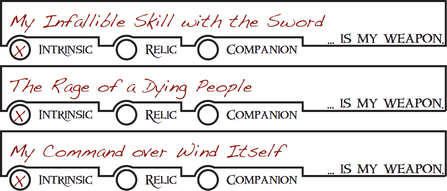
Relic Weapons are items of power that have personal meaning. Relic Weapons can take the form of literal weapons, holy symbols, heirlooms, mysterious artifacts, etc.
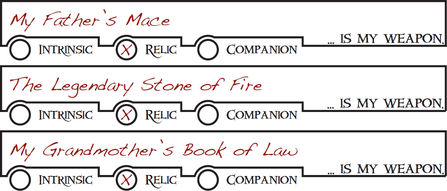
Companion Weapons are those who travel with you, cursed or blessed to never leave your side and to die for you. Companion Weapons can take the form of mortals, animals, armies, Mythic beings, etc.
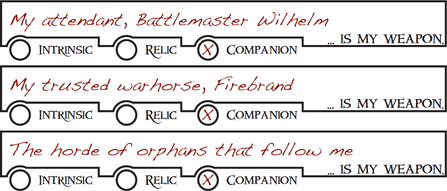
Restrictions on Weapon Types
When making your three Weapons, they cannot be all of the same type. You may have two of one type and one of another, or all three of different types.
Coming Up With Your Weapons
Your Heart and Past have ideas for Weapons. Use them as-is, tweak them to fit your character, or come up with other ideas that make you eager to End Myths.
Write your Weapons by filling in the line “____________ …is my Weapon.” Make each one personal. These aren’t just anyone’s Weapons. They’re yours.
Picking a Good Weapon
When it comes to making a good Weapon, ask yourself for each one: “How will I complete destroy gods and monsters with this Weapon?”
If you know the answer, it’s probably a good Weapon. If you don’t, then it’s certainly not.
How much detail for each Weapon?
Put as much detail as you like, whatever is enough to inspire you to play an exciting godkiller, and whatever’s enough to make it clear what that Weapon means to everyone else at the table. If you find that you added too much or not enough to your idea, change it in play.
Look at the other Hearts & Pasts
The other Hearts and Pasts may have Weapon ideas that fit your concept, or may inspire more ideas. Don’t feel restricted to just your lists.
Quick Weapon Creation
If you’re doing quick creation, pick three Weapons from your lists. You can tweak them if inspiration immediately strikes, such as changing “My Father’s Mace” to “My Mother’s Mace” or “My Mentor’s Lance.” If you immediately have an idea for a Weapon that isn’t on that list, then go ahead and write it down.
Often, people will have a strong, original idea for one or two Weapons on short notice. The lists exist so that you can come up with all three within five minutes. Don’t worry about them fitting perfectly to a vision; either you’ll discover how that Weapon works, or you’ll come up with a new idea during play.
If you absolutely cannot come up with an idea and cannot make any of the Weapons on your lists fit your concept, you can leave one Weapon blank, to be filled in during play.
Your Weapons Are Inseparable
Your Mythic Heart is connected to these Weapons just as it is connected to you. Your Weapons can never be truly lost or stolen. One may be briefly knocked out of your hands or otherwise momentarily denied, but only until you choose to regain it. You might wait to regain your weapon simply to create an opportunity to fight your way to regain something personally connected to you and to show the Mythic World that you will not be stopped.
Differences Between Weapon Types
If you’re curious, you can find out more about the differences between Intrinsic, Relic, and Companion Weapons in The Weapon Types.
Changing Weapons During Play
Your Weapons can change! See here for more on that.
DAMNING YOUR MYTHENDER
Your Mythic Heart corrupts you with every beat. It haunts your dreams, twists the world around you, and slowly changes you into the vile Myth it demands you to be. You are cursed and damned by this Fate.
Your Mortal Form
It’s important to note how you appear normally, since that changes as you become more Mythic. In the Mortal Form box, write down a few words about what’s notable: are you a large or small person? Do you wear anything special? Do you have any markings? What does your skin and hair look like?
Your Fate
You know that your Fate is to become a god, and are reminded of this every night by your Dream, every day by your Personal Blight, and every time you steal Mythic power by the way your appearance changes to be less mortal.
The Fate you chose earlier has two different takes on all this filled out for you. Pick one.
Your Dream
Every night, your Heart sings a lullaby of temptation and power, a glimpse of your beautiful and horrific future. This is your Fate’s Dream. These are not nightmares; those scared by such a dream lack the will to be a Mythender. But it never relents. Sleep offers no respite from your trials.
Your Personal Blight
Your Fate constantly leaks into the world around you, making a small but noticeable impact everywhere you go. This is your Personal Blight. It’s a constant effect that alters one thing, be it weather, animals, or mortal feelings. You may never turn this off, though you may use it to power your fight against gods.
On your playsheet, the Personal Blight space ends with …in my presence to remind you that it’s a permanent, horrific effect you’re powerless to stop.
Multiple Mythenders and Contradicting Blights: if the Mythenders have personal blights that contradict one another, cool! Totally workable. Whoever is the focus in the moment has the dominant effect.
Your Forms
As you take on more Mythic Power, your physical form changes to become more like the god in your Dream. Your Fate lists the three forms you’ll take as you gain Corruption.
The Paragon Form is the first step, like a perfect human, with one twist of the divine. The Supernatural Form is the second step, crossing further into Myth. The Godly Form is the final step, where you appear just as the god in your Dream.
On your playsheet, each Form space starts with I appear as… to remind you that this is only how you appear, and not how you’re forced to act.
This is not a one-way process. If you take time to gain mortal sympathy and heal your soul (see here), you’ll start to slide back down toward your Mortal Form again.
Your Powers Over Mortals and the Land
Being a short leap from apotheosis comes with access to great power, feats you can perform that fall under your future godhood’s domain. Your Fate offers some options, but this isn’t a comprehensive list; if some action or effect feels related to your domain, you can probably claim the ability and privilege to do that as well.
On your playsheet, the Fate’s Power space starts with My Fate allows me to… to remind you that this is granted by the Mythic World, and always has a price.
Personal Blights, Powers, Mythenders & Myths
You and other Mythenders are not directly affected by your Personal Blight or your Powers, so they will not feel any emotions or be stopped by any foul weather you cause. Likewise, your Companions are unaffected, unless for some reason you will them to be. Myths aren’t affected by them unless you incorporate them into some form of attack or onslaught.
Making Your own Fate
If you have time for full character creation, you might want to make your own Fate. Tweak the ones in this book or use them as inspiration and examples for inventing all new ones.
Your Dream
Come up with something alien and extreme. Gods aren’t moderate beings by nature. Describe it on your personal sheet.
Your Personal Blight
Describe a single thing that happens constantly around you that’s either: a phenomenon or weather element, an animal oddity or behavior, or one emotion felt in mortals. Don’t force mortals to do something or kill them with your Personal Blight; that’s what your Fate’s Powers are for.
Your Forms
The three Forms all progress from minor changes to becoming the god in your Fate’s Dream. When coming up with your Paragon Form, make one single change to your Mortal Form (i.e. having a halo, your skin turning blue, or growing in size). For your Supernatural Form, add a couple more changes that clearly make you a frightening demigod. Your Godly Form is that which is in your Dream.
Only describe how you appear, now how others treat or react to you, or how the world changes around you. Describing those things are the Mythmaster’s job.
Your Powers Over Mortals and the Land
Your Powers should be linked to the sort of god you’ll become. Look at these listed with the available Fates and choose ones in similar scope that fall under your future godhood’s domain. The Powers listed in this book are just suggestions.
Leaving Things Blank
If you really need to, leave some parts of your Fate blank. But know that if you’re struggling to come up with a good idea right now, you may also struggle when you need to in the middle of a battle, so it’s worth taking some extra time now to fill those in/
BONDING TO THE OTHERS
First, a Name
Before you can deal with the Bonding process, you and your fellow Mythenders all need names. If you’re making a character from Mythic Norden, there are some names in its chapter. Otherwise, pick a name from wherever your Mythender is from or whatever your character chose to renaming him- or herself.
Sometimes a Mythender use a title or epithet, such as the Deathwatcher, of the Southern Blade, Prince of the Forgotten, the Eternal Fire, She who Brings the Stars, the Shrouded, Warlord of all Haleish, the Flood of Lamentation, and so on.
If you’re drawing a blank, and random name generators and books like the Story Games Names Project don’t help, consider the name “Ryan.” It’s a fantastic name for someone who feels like killing a god.
Choosing Your Bonds
If you have been doing Mythender creation alone, stop now and do the rest of this process together as a group. This is where the Bonds Sheet will come in.
Going around the table, one player at a time will pick one of the Bonds from their History and write it down on his corner of the Bonds Sheet, filling in the line:
I hesitate to murder _______________________ because:
With the name of another Mythender and describe the Bond. Each time someone makes a Bond, talk briefly about it. This is about that relationship, and has some element that is specific to that person, so it’s important for both players to be on the same page regarding these Bonds. Be open and flexible.
At the end of this, every Mythender will have a Bond with every other Mythender.
Quick Bond Creation
If you are doing this quickly, then just pick a bond with the player to your left. That means the player to your right will pick one with you. Fill in the names of the other Mythenders, but leave the reason you hesitate to murder them blank. You can finish those rest in play, if you’re so inspired.
Prior Relationship Bonds
The Bonds on each Past related to that Past’s general world view. However, none of the Pasts’ Bonds take into account something more personal: relationships between two Mythenders who knew each other before they gained their Mythic Hearts. Some Bonds include:
…is my mother/father/daughter/son/other family member.
…took me in when no one else would.
…and I grew up together/apprenticed to the same master.
…and I both became Mythenders in the very same place and time.
Ask with any Bond, talk with the other player before finalizing this. If you both like this bit of backstory, then great! Write down that Bond. Note that the other person don’t have to write a mirroring Bonds for you—if you write I hesitate to murder Erik because he is my son, he don’t have to write I hesitate to murder Úlfdís because she is my mother. That player might still use a Bond from her Past, such as …because Erik joins me in suffering (for the Mourner) or …because Erik reminds me why I rebelled. This is all rich ground for roleplaying opportunities.
Making Your Own Bonds
When coming up with your own Bonds, look at the other Bonds for guidance. The most important thing to keep in mind is that Bonds are why you actually like, care about, or accept another Mythender. These should be positive, not antagonistic. If you screw this up and make an antagonistic one, then make sure to set aside time in play to make more Mythenders, because one of you will kill another.
Boring Bonds are Invalid
If you come up with some bond that isn’t directly involving just one other person and has a kernel of something interesting going on, then it’s not a Bond. (Which means it won’t count when Murdering Another Mythender.) This includes someone trying to fill in a Bond with “I hesitate to murder everyone because I like everyone.” That’s exactly the same as writing nothing down, because that’s not a personal connection with another Mythender. And such a character wouldn’t have any strong reason to be with this group of people, so that answer’s even worse.
FINISHING UP
There are three more things you need to do in order to be done with making your Mythender. Luckily, they’ve already been chosen by now, so you just need to write them down.
First Gift

Your Mythender’s Heart has a Gift listed on it. That Gift is a special trick you have during battle. (Gifts are listed in more detail in their own chapter).
Write down your Gift and its Might Cost on the first Gift slot.
Don’t worry about what this means right now. If you’re playing the Tutorial Battle, you’ll learn all about it.
Storm Rating
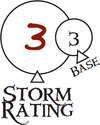
Your Storm rating governs how much raw power you gain each turn in battle just by doing something minor. Every Mythender has a base value of 3, written on the sheet.
If you have the Harbinger of Storm gift: write 5 in the Storm rating circle. You get 2 Storm more than normal. If you don’t, write 3 instead.
Starting Might
At the start of every adventure, a Mythender has 5 Might tokens. If you’re going right from Mythender creation into playing, take your 5 Might tokens now.
Starting Form
Since you start with no Corruption boxes checked, you start at your Mortal Form. The other Forms will come into play as you check off Corruption.
Wound Cost & Boxes
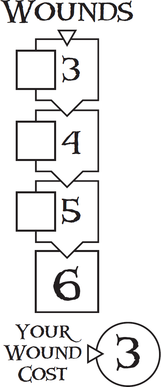
Every Mythender has the same Wound cost of 3 and the Wound boxes, as show here. These are explained in the Battling Myths & Gods chapter.
You’re Done!
And that’s it! Now go End some Myths.